|
Lower Road
East Farleigh
01622 726282
https://whatpub.com/bull-east
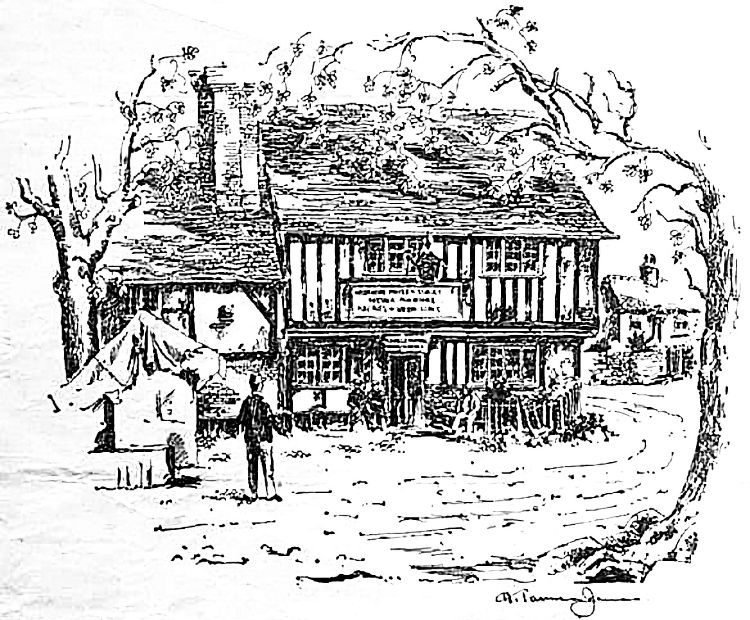
Above drawing, date unknown showing the "Old Bull." |
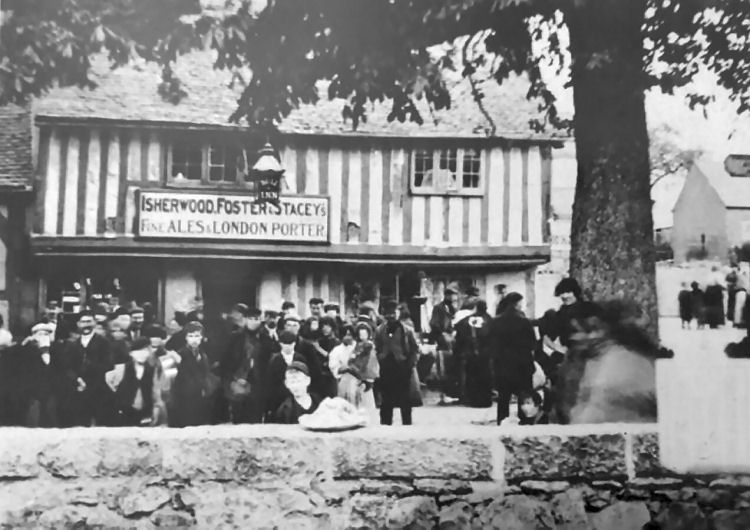
Above photo circa 1895. Kindly sent by Rory Kehoe. |
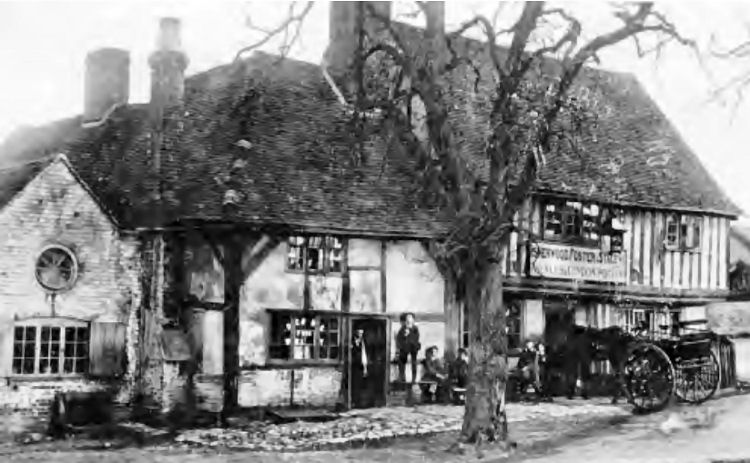
Above photo, pre 1900. |
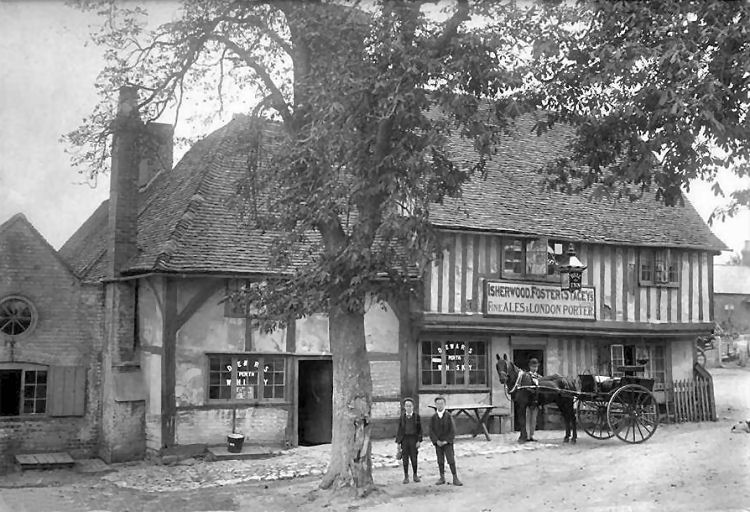
Above photo, pre 1900, kindly sent by Rory Kehoe. |

Above photo pre 1900, kindly sent by Mark Richford. |
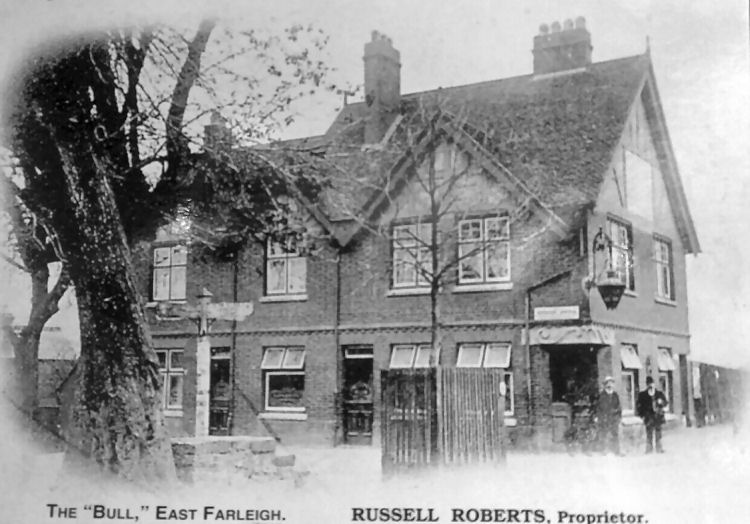
Above postcard, circa 1900, kindly sent by Rory Kehoe. |
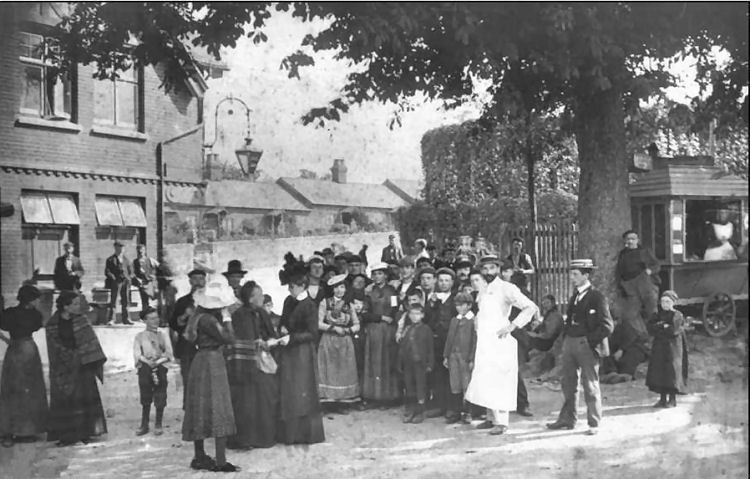
Above photo post 1901. Kindly sent by Rory Kehoe. |
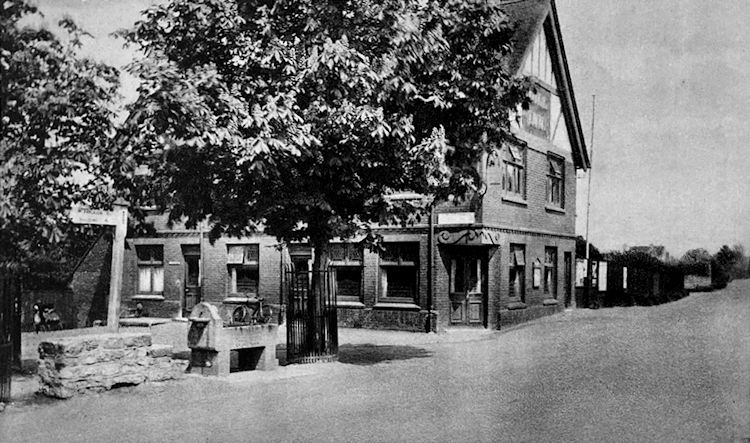
Above photo, circa 1935, kindly sent by Rory Kehoe. This photograph was
taken at about the time that the Bull changed licensees and may well
have been used by the new landlord as a business publicity card, as was
the fashion at the time. |
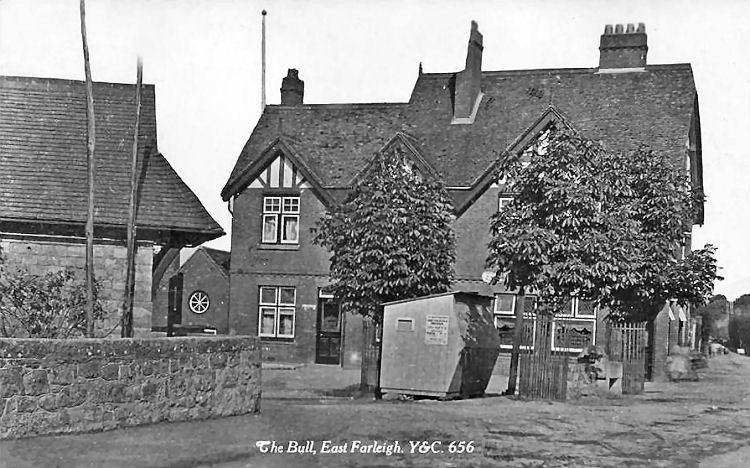
Above photo, 1960, kindly sent by Rory Kehoe. |
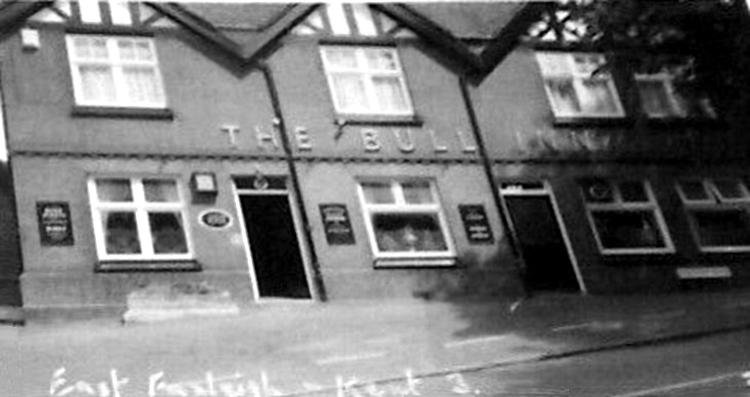
Above postcard circa 1975, kindly sent by Rory Kehoe. |

Above photo, date unknown. |
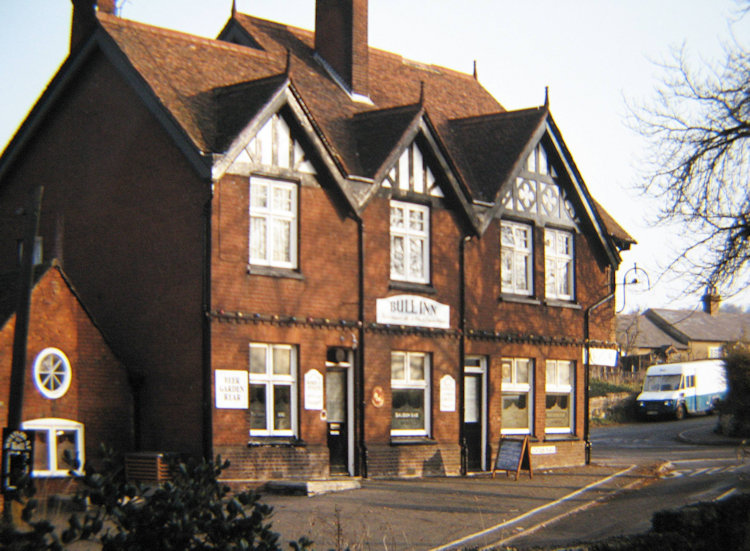
Above photo, 23 November 1983, by Jim Ashby. |
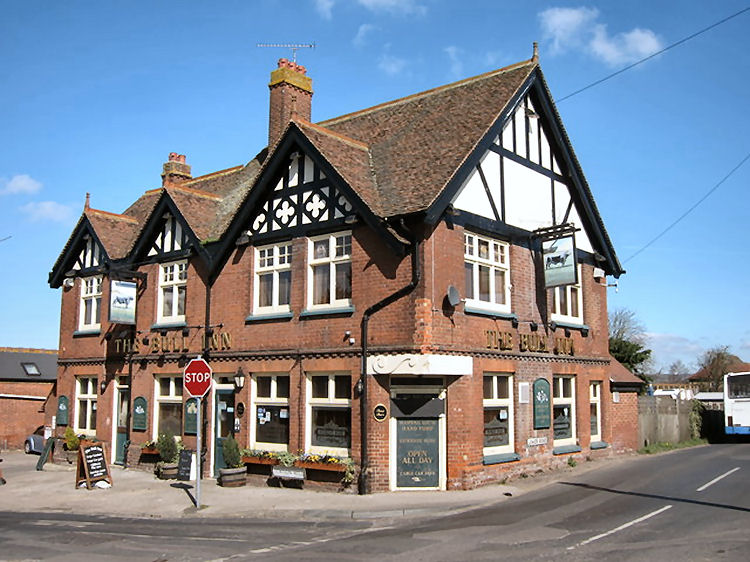
Above photo 2011 by Oast House Archives
Creative Commons Licence. |
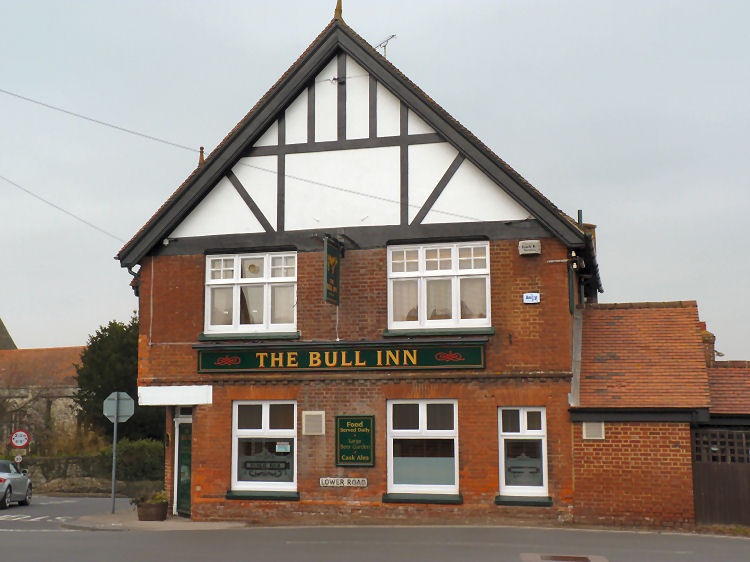
Above photo, kindly sent by Tricia Francis, 24 March 2015. |
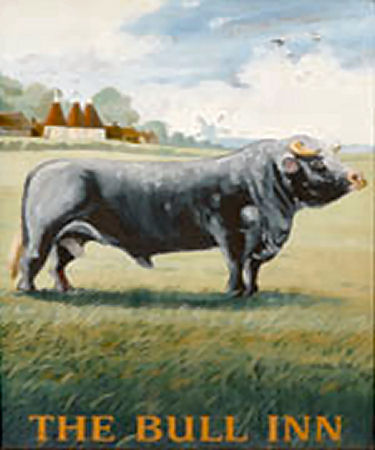 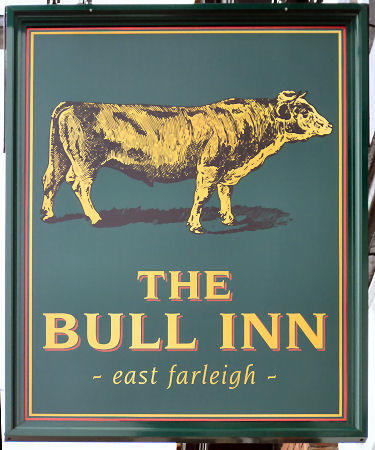
Above sign left, 2012, sign right, 2015 by Tricia Francis. |
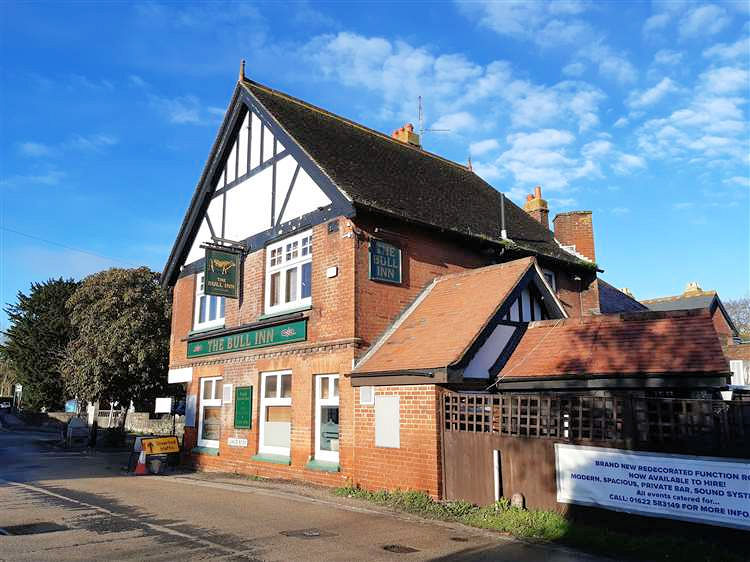
Above photo 2022. |
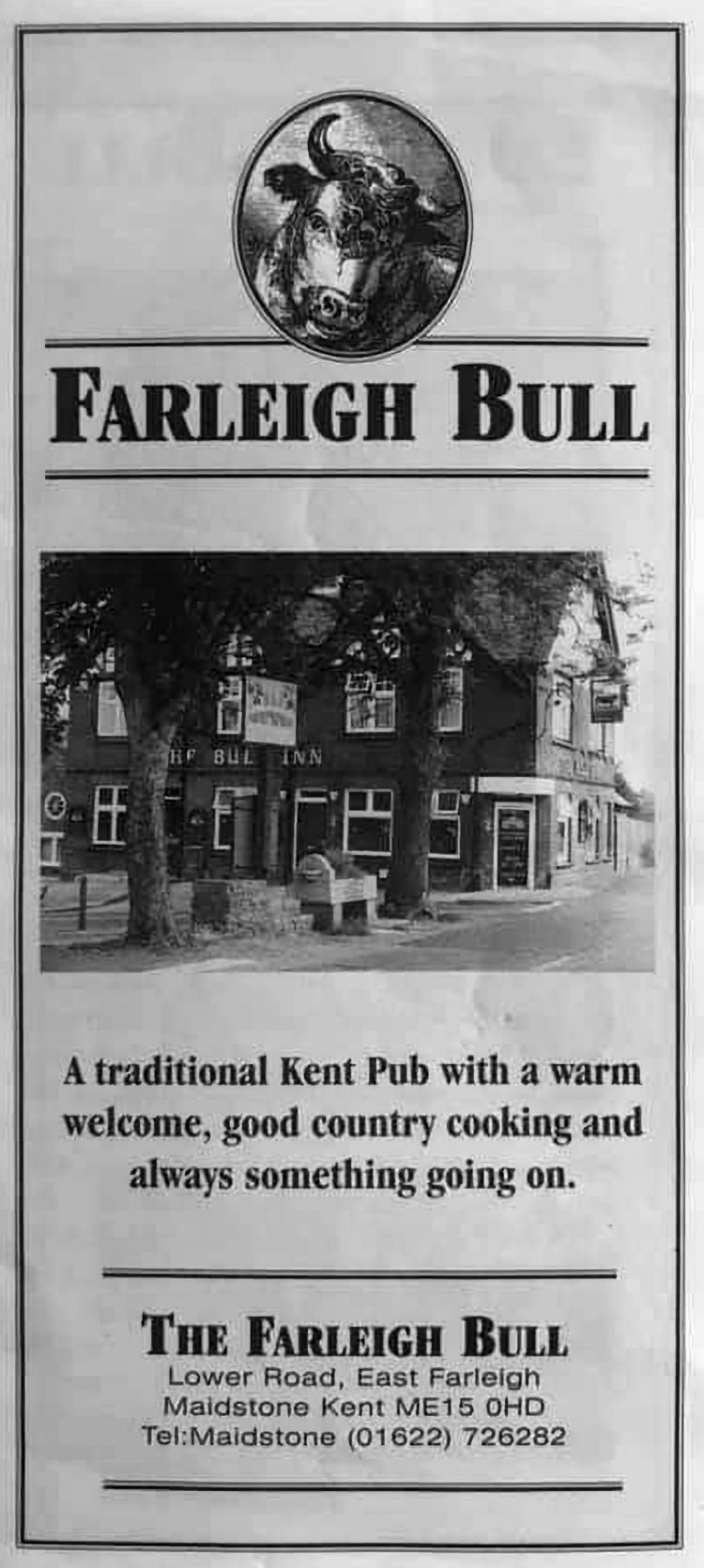
Above advert, date unknown. |
The following passage was found on a document, I presume once displayed
inside the pub.
This Inn known by the name of sign of the "Bull" was built in the final
year of Queen Victoria in 1901. It was erected on the site of and replaced a
much earlier building that was also called the "Bull," that was destroyed by
fire at the turn of the century.
This earlier structure, built in the second year of Elizabeth I, in
1560., was originally a farm dwelling forming part of a larger estate. It
was first licensed with an ale licence in the year 1653. This was after most
of the land had been disposed of, and the small parcel that remained had
been cultivated to grow hops. The first tippler, as ale house keepers were
then called, to draw ale here was one Joshua Scoffelde, hop grower and
brewer. He was a tenant farmer to the estate of Richard Baker, esq., of the
parish of Cranbrooke, who held the mortgages on lands and properties, in the
parish and the parishes of Staplehurst, Teston and East Farley.
At the date of founding the property was part of the estate of one Thomas
Selden of Maidstone, in whose descendants it continued down until at length
it was disposed of by sale by one Thomas Sychard of Maidstone in 1639. He
decreed it by will in 1661, to his nephew Augustus by Sychard, in whose
descendants it continued until at length it passed a Richard Baker, a
descendant by marriage.
Joshua Scoffelde held the licence until his death in 1704, until that
date the house had been a registered beer house, or tippling House. In the
year that he died, his son Samuel took over the licence, but a year later
applied for and was granted full licence, in doing so he registered the
house under the title of the "Bull." Like his father before him, Samuel
Scoffelde was a hop grower and brewer, and the ales he sold here were his
house brewed beverage.
The Scoffelde family kept the "Bull" for many years. In 1743, one Thomas
Schofield (now spelt thus) was "Schofield the Osler at the Bull." The inn
had commodious stables and was advertised as a resting house for travelers.
Thomas Schofield died in 1762. In that year he was replaced by one William
Martyn, innkeeper and harness maker of Toville, (now Tovil). At the height
of the coaching era, the "Bull" became an established halt. It was never a
main stage, but a resting place or a transferring point, on the outlying
Yalding to Tunbridge Wells. The inn could boast stabling facilities for 36
horses. In 1700 the house was kept by Peter Poundford, horse dealer and
carriage proprietor. This was where one could hire carriages or horses at a
daily rate.
Peter Poundford stayed at the "Bull" for 36 years, until his death in
1826. During his stay at the inn he had built up a thriving horse trading
and carriage business, which, by the terms of his will, he left to his
nephew Edward Freeman, who in that same year moved his uncle's business to
the "King's Head" at Wateringbury, where he had just been granted the
tenancy.
1826, one Thomas Chittenden came to the "Bull." He held the licence here
until his death in 1845, where upon his widow, Martha took it up, staying
until her own death 1863. In that year one George Startup took over. He left
in 1871 and was replaced by Mark William Stringett Tapsfield, hop grower and
beer seller. At this date, the propriety was owned by the Phoenix Brewery at
Wateringbury. Mark Tapsfield kept the "Bull" until his death in 1890,
whereupon his son Joseph Wilberforce Tapsfield took over the licence. He
left in 1899, handing over to George Norris, who in that year paid an annual
rent of £24 for the tenancy. He was the last keeper to reside at the old
"Bull," for, In January 1900, a fire broke out in the living quarters,
fanned by steady breeze. It quickly spread through the old timber framed
building, until at length the whole building was destroyed. In 1901 the
Phoenix Brewery ordered the construction of a new "Bull." It was completed
that year. The first keeper to draw ale here was one Arthur Jones.
Today the bull gives out the same glow of warmth and hospitality and
stands as a reminder of days gone by.
However, I have also found an article dated I believe 1897 (the last
digit of the original year wasn't clear, but looked like a 7) that suggests
that the pub was about to be demolished for a new build, and this predates
the mention of the fire.
Closed November 2022, but after being renovated again reopened in January
2024.
|
Kentish Gazette 29 January 1802.
On Saturday poor woman, who was sitting at the "Bull" at East
Farleigh, in apparent health and spirits, reclined her head on the
table, and without the smallest appearance of ill health expired in
an instant.
|
|
Kentish Gazette, 16 February, 1821.
DEATH.
Feb. 3, Mr. Monk, landlord of the "Bull," Farleigh.
|
|
From the Kent Herald, 20 May 1824
On the following day inquests were held at the "Bull," at East Farley, before
the same Coroner, (J. N. Dudlow, Esq.) on the bodies of John Standen, age 64 years, and Sarah Larkin,
a child about 15 months old, whose deaths were occasioned by the following
melancholy accident:-
The deceased John Standen was a glover, residing at Gaudhurst, with his wife,
and daughter and her husband, their child (the deceased,) and another grandchild
of Standen's, were on Friday last returning from Maidstone through East Farley.
They met two wagons laden with corn, the horse passed the first wagon, but took
fright at something on the second, and backed the cart up a bank by the side of
the road, upset it, and threw the whole party under the wagon. The wheels went
over Standen, his wife, Mrs. Larkin and her child. Standeng was killed on the
spot, and the child lived till 3 o'clock the next morning. Mrs. Standen was much
bruised, and now lies in a very bad state. Mrs. Larkin received but little
injury, and her husband and the other escaped unhurt, but the wheels were in
half an inch of Larkin's head. No fault is attributed to the driver of the
wagon, who stopped his horses as soon as it was possible.
The Jury returned verdicts of "Accidental Death," with deodand's on the wagon
and Horses.
|
|
From the Kent Herald, 31 August 1826.
MARRIAGE.
August 23, at East Farley, Mr. George Crittenden, of the "Bull Inn," at that
place, to Miss Martha Walter, of Wateringbury.
|
|
Kentish Gazette, 20 August 1850.
EAST FARLEIGH. Hop Dinner.
On Wednesday last, the annual hop dinner took place at the "Bull Inn,"
and was well attended. Mr. Fancett, of Maidstone, was in the chair. Mr.
Charles Birchall was declared the winner of the sweep for last year. The
sets for the present year ranged from £110,000 to £225,000. The average
betting was in favour of £200,000.
|
|
Southeastern Gazette, 10 May 1853.
FARLEIGH, EAST.
An inquest was held at the "Bull Inn," on Tuesday last before J. N.
Dudlow, Esq, and and an intelligent jury, touching the death of Jane
Jury, who had been lost since the 6th December, when she left her
home at Waterinbury and her body was found in the river by the
lock-keeper on Monday morning and was put in an oasthouse close to
the river. The jury having viewed the body, which presented a
shocking sight, much of the clothes being destroyed by the time it
had been in the water. The following evidence was then given:—
Copnin, the lock-keeper proved the finding of the body.
Jane Fuller said she was certain that it was the body of her mother;
they lived together on the 6th December, which was the last day she
saw her alive. She went to her work and afterwards went to East
Peckham and paid a small bill; that was about five o’clock in the
evening; it was a dark wet night and a flood. All the ponds about
were searched at the time, but to no avail.
Elizabeth Hollands, a neighbour, identified the body, and also
confirmed what the daughter had said.
Mr. Kennett, surgeon, said he had examined the body, which had been
in the water a long time; had no doubt death his caused by drowning;
there were not any marks of violence on the body; the ring was on
the finger, but he heard there were no money in her pockets.
The jury returned a verdict of "Found drowned."
|
|
Local News on this day 5th December 1857.
At the Kent Winter Assizes, James Crosby, a polepuller employed by Mr.
Cook was charged with stabbing Michael Langham, with intent to do him
grievous bodily harm on 15th September. Mr. Platt appeared for the
prosecution.
Mary Langham, the wife of the prosecutor, said that on the night of the
15th September, she was with her husband at the "Bull Inn" and the
prisoner and his wife were also there. She and Mrs Crosby left before
the men, to return home to cook the supper. In about half an hour,
Crosby came in and said he would have revenge on Langham, and that if he
had his hook, he would cut his head off. He then eat his supper and went
to bed. Shortly afterwards, Michael Langham came home and challenged
Crosby to out and fight like a man! They then both went out and she
noticed that Crosby took something from a shelf. On going outside, she
saw her husband on the ground and Crosby on top of him. A person named
Bruce interfered and parted them.
Mary Mills corroborated the evidence of Mary Langham and in addition
stated that she saw the prisoner with a fork in his hand, and after the
men were parted, she had seen blood upon it. James Bruce stated that on
hearing the cry of "murder" he went outside the hop oast and found the
prosecutor and prisoner struggling together on the ground, the prisoner
being on the top. After separating them, two or three times, he
succeeded in stopping the fight. He did not notice the prosecutor was
wounded as it was dark at the time.
Michael Langham stated that on the night in question, he went to the
"Bull," where the prisoner was. A person in the room, asked if the
prosecutor was an Irishman, to which he replied, "yes a rank Irishman,
to which the prisoner took objection to the term "rank" saying that it
was vulgar. The prosecutor applied to a "classical scholar" in the room,
and an animated discussion took place as to the propriety of the
expression. High words ensued, resulting in the prisoner striking him.
Subsequently the prisoner left the public house and when the prosecutor
returned to the hop oast, he found him in bed. The prisoner (who
acknowledged he was drunk at the time) then said the prisoner had hit
him like a boy and now should come outside and fight him like a man. The
prisoner came out and they began to fight and the prisoner stabbed him
in about twenty places and stated he would take his life. The prosecutor
"lay for dead" at the oast house all that night and the following
morning, was removed to the Union, where he stayed for three weeks.
Mr Frederick Fry, surgeon, stated that he was the medical officer of the
Union, and on 17th September, attended Michael Langham. He had fifteen
punctures and five distinct wounds, three of which were upon the right
side of the abdomen and two on the left side of the chest. The wounds on
the chest were very serious, and one of them must have penetrated the
lungs, as he coughed up blood for some time afterwards. The jury
returned a verdict of guilty, and the prisoner was sentenced to twelve
months' hard labour.
|
|
South Eastern Gazette, 16 October, 1860.
Farleigh East. Sudden Death.
On Tuesday morning last, a labouring man, named Richard Smitherman,
aged 69, was found dead in his bed. The deceased had been to London
on the previous day, and on his return home took up his lodging at
Mr. Crittenden's, the "Bull Inn." He want to bed in apparently his
usual health and spirits, and at six o’clock on Tuesday a fellow
lodger got up and left the room, having spoken to deceased, who then
appeared vary well. At about half-past 10 the girl went up stairs to
make the beds, when she found deceased lying in bed as if dead. She
gave an alarm, and a medical man was speedily sent for, but life was
extinct. There was no doubt that death had arisen from disease of
the heart, and the coroner has therefore thought it unnecessary to
hold an inquest.
|
|
From the Maidstone Telegraph, Rochester and Chatham Gazette, 28 September 1861.
Fatal Attack by Irish Hop Pickers at East Farleigh, near Maidstone.
On Saturday night last an alarm in disturbance to place in the village
of East Farleigh, in the course of which a man name Reynolds, otherwise
Bennett was so severely and savagely beaten that he has since died. Our
readers are no doubt aware that a large number of the hop pickers in
this locality are Irish, and of course of conduct they sometimes resort
to upon the slightest interruption. On Saturday night a large number of
these Irish pickers were drinking at the "Bull Inn" in the village, when
a row took place between them and some of the inhabitants. The house,
which is well conducted, was closed at 11 o'clock, but the quarrelling
was continued for some time outside and some half dozen of the Irishman
it is said fell upon Bennett who is an agricultural labourer living in
the neighbourhood, and beat and kicked him in the most brutal and
shameful manner. A man who was with him and interfered with them was
also attacked with similar violence, but Bettett was at length taken
away from his assailants and went to his home. He got up the next
morning and walked as far as the "Bull," but complained greatly of pains
in the head and chest and returned home again. Shortly afterwards Mr.
Stokoe, a surgeon residing at Coxheath was sent for and did all that his
skill would allow to subdue the alarm in symptoms which had set in. The
man, however, grew rapidly worse, lingering till Monday afternoon, when
he died of the injuries he had sustained. His head was in a most
frightful state and is chest was very black from the blows and kicks
which he had received.
We are happy to say that some of the fellows are in custody, having been
taken before the magistrates of the division and remanded till after the
coroner has held an inquest.
The Inquest.
On Thursday at noon a coroner's inquest was held at the "Horse Shoe
Inn," East Farleigh, before J. N. Dudlow, Esq., county coroner, upon the
body of George Reynolds, otherwise Bennetts, age 45, whose death
resulted from the effects of violence. The jury, after viewing the body,
return to the "Horse Shoe," when the coroner briefly addressed them -
defining the law relating to manslaughter. The following witnesses were
then called.
Arthur Lovelock, labourer, living at East Farleigh, said, I knew the
deceased, who was 45 years of age, and a labourer. On Saturday night,
the 21st inst., I was at the "Bull Inn," East Farleigh, with him. There
were also some Irishman there. We left at 12 o'clock. I, George Reader,
and the deceased came out together, and as soon as we got out, Bennett
was knocked down. No words had passed. He was knocked down by some one.
I don't know by whom; but when he was down, I saw Sullivan and Charles
McCarthy, kicking him. I could not see where they were kicking him.
There were, I should say, half a dozen around him, but I did not see any
of the others kick him. I don't know the names of the others. I said
"don't kill the man." and directly I said so, Sullivan knock me down. A
young man came along and took them off me. I then got up and ran about 8
rods, when two of them overtook me and knocked me down again. When I got
out the second time I went back to the deceased, who was then standing
near the "Bull Inn." We stood talking there about half an hour. The
parties who assaulted us had then left. Deceased said twice "I shouldn't
care if I was not more hurt than you are." He bled very much from the
forehead, over one of his eyes. He did not say any more to me. Deceased
then went down to the outhouse again. I did not see him knocked down
more than once. Deceased was dryer to J. Ellis. Esq.
By a juror:- The men who kicked the deceased had shoes on. I did not see
any sticks in their hands. There was no quarrel in the house that I know
of. Reader "shucked" up with his trousers, and Charles McCarthy and
Sullivan said they would take his life for its. I told Reader what they
said.
George Reader, labourer, East Farleigh, deposed that he was at the "Bull
Inn," on Saturday night, the 21st inst. There was no row or quarrelling
that he heard. He left the house about 12 o'clock, with Lovelock - the
deceased being closely behind them. When they got outside the "Bull" he
saw Charles McCarthy, John McCarthy and Timothy Sullivan. There were
other persons standing around, but he could not say who they were. Some
person, he could not say whom, nnocked the deceased down, and Timothy
Sullivan and Charles McCarthy kicked him while he lay under the stool.
Deceased was kicked about the body. He did not see any other person kick
him. The last witness said "don't kill the man," and Sullivan directly
struck him. He did not see the deceased get up, for he started for
assistance, and on his return he saw Charles McCarthy and Sullivan,
running after Lovelock, who they overtook, and Sullivan again got him
down. A young man pulled them off Lovelock and they then went away. The
afterwards saw deceased who pointed to his left eye, where was a gash,
and said "I have got a cut over my eye, and I feel stiff and sore on my
chest." The man who kicked deceased wore "heavy spiked shoes," and they
kicked him very severely. He did not see any person excepting Sullivan
and Charles McCarthy kick or ill-use the deceased.
James Reader, labourer, said he was at the "Bull Inn," Farleigh, on
Saturday. There were several persons there, among whom was deceased.
There were several Irish there. There was no real or disturbance. He had
no words with anyone. He went to the candle to get a light to his pipe
when some persons snatched the candle from his hand and he left the
house at once. He did not expose his person to the woman who were
present. He did not see anything of a row, nor was there any quarrelling
inside the house. He did not see anyone interfere with the Irish party.
He left the house at about half-past eleven. John King, after the candle
was taken from him, told him that they the Irish party intended to do
for him, and King persuaded him to go home, which he did. He saw the
deceased next morning when he (deceased) said he was going home. There
was a cut on deceased's forehead, but he (deceased) said he didn't feel
much of the cut he felt most of it in his left side, where he had been
kicked. Deceased did not say who kicked him. Deceased was perfectly
sober on the Sunday morning when he saw him, but on the Saturday night
he was neither drunk nor sober. He had been drinking with the a lot of
others.
Richard King, labourer, East Farleigh, said he did not hear or see
anything of the row at the "Bull Inn," but immediately afterwards he was
close under a wall near the house when two men, who he believed to be
Sullivan and Charles McCarthy passed him. They said, "We've done for one
and will do for another." There was no quarrelling before he left the
house. He told the last witness (Reader) that one of the men (neither
Sullivan nor Charles McCarthy) had said he would do for him "Reader).
Mr. Stokoe, surgeon, deposed that on Monday afternoon about five o'clock
he was called in to see the deceased, who was then in a dying state.
Deceased was rapidly sinking, and died about seven o'clock on the same
evening. he told him (witness) that he had been very much knocked about,
and complained of severe pains in the pit of the stomach, the chest,
and the head. On making a post mortem examination he found the chest and
back, down as far as the lions, very severely injured. There was a great
deal of extravagated blood among the muscles of the chest - evidently
the result of great violence. The nasal bone was fractured on the left
side. The head was very much bruised. He had no doubt the death
resulting from the shock to the nervous system, caused by the violence
which had been spoken of.
The jury, without hesitation, returned a verdict of "Manslaughter
against Charles McCarthy and Timothy Sullivan," and the coroner made out
of the warrant for their commitment.
|
|
From the Maidstone Telegraph, Rochester and Chatham Gazette, 14 December 1861.
Manslaughter at Farleigh.
The following is the only case of importance which we admitted in our
assizes report last week.
Timothy Sullivan, 23, labourer, and Charles McCarthy, 24, labourer, two
determined looking Irishman, were indicted for the manslaughter of
George Bennett, at Farley, on the 21st of September. Mr. Russell and Mr.
Addison appeared for the prosecution, and Mr. Ripton for the prisoners.
Mr. Ribton said that the bill for murder had been thrown out by the
grand jury, and he understood the prisoners were now to be proceeded
against on the coroner's inquisition, and he wish to call his Lordships
attention to the Lord Chief Justice having within the last 12 months
strongly condemned prosecuting under such circumstances.
His Lordship said he was quite aware of it and as Mr. Ribton stated, but
he did not know why the grand jury has thrown out the bill, and did not
think therefore, he ought to stop the case.
The Clerk of Arraigns said that the grand jury originally marked on the
bill that it was thrown out because three material witnesses were not
present. One of them, the surgeon, had since attended and been examined,
but the other two was still absent.
The case was then allowed to proceed, and Mr. Russell having addressed
the jury for the prosecution, asked the following witnesses:- Arthur
Lovelock, residing at East Farleigh, said on Saturday, 21st September, I
was at the "Bull Inn," East Farleigh. I saw both of prisoners there, a
man name Reader and the deceased. They were drinking and singing.
McCarthy then said, "If Reader is not off I will do for him." I heard no
quarrelling. I left about 12 to go home. I saw Bennett when I got
outside. I saw him knocked down but I did not see by whom. When he was
down I saw the prisoners kicking him. I did not see anyone else kicking
him. There were several other person standing around. The kicking lasted
several minutes. I said, "Don't kill the man;" and Sullivan knock me
down. I saw Bennett's face when he got up. It was bleeding very much,
and there was a cut over the Eye.
By Mr. Ribton:- There was seven or eight person standing round. I knew
that originally there were several others charged with the offence.
Re-examined:- There are about 10 other Irishman with the prisoners at
the "Bull," and about 7 or 8 outside.
George Seager, labourer, residing at East Farleigh, said:- I was at the
"Bull Inn," at East Farleigh, on the night in question, with several
others. There were about 10 Irishmen there. There was no quarrelling. At
about 12 the landlord turned us out. The prisoners and their parties
were out first. I went out with Bennett and others. The prisoners was
standing outside, and McCarthy asked us if we thought it was a mainly
action for Reader to do has he had done. We answered we thought it was
not. Soon after someone knocked Bennett down, and the prisoners began
kicking him. I went for help, and heard the kicking going on as I left.
Bennett afterwards overtook me. He had a cut over his eye, which was
bleeding very much. I soon afterwards separated from Bennett and never
saw him again alive. He was in good health before going to the "Bull"
that night.
Richard King left the "Bull" on the night in question just before
Bennett. He subsequently heard the prisoners come along the road, and
one of them said, "We have done for one man, and we will do for
another."
Cross-examined:- That was all I heard them say. The prisoners followed
Reader and me out.
Ann Baker, mother of deceased, said:- My house is about a mile from the
"Bull." Deceased lived with me. I heard deceased come in about 10
o'clock on Sunday night, but I did not see him till the following
morning. He complained of pain and said he had been much ill-used. He
asked for water, and when I took it to him he said he could not see the
pot in which it was. He complained of pain all over his body. I sent for
a surgeon.
John Robert Tapsfield said he was at the "Bull" about 1 o'clock on
Sunday, and saw Bennett there. Deceased's face was all over blood, and
he complained of a great deal of pain in the chest. He groaned a great
deal.
By Mr. Ribton:- He had no beer there. He called for a pint afterwards,
but did not drink it.
Paul Henry Stokoe, surgeon, at East Farleigh, was called in to see
deceased on Monday. Deceased was lying on the bed at his mother's house.
He complained of pain in the pit of his stomach, and general soreness.
He said his head and face were very tender. His face was much swollen.
The skin over both eyes was scratched. There was a clean cut incised
wound over his left eye about three quarters of an inch in length. There
was another scratch or cut on the nose. The whole of the scalp was very
much swollen, and in a pulpy state. The chest was in the same condition.
The skin of the chest was raised like a blister. Deceased was in a dying
state. This was about 5 o'clock, and he died in the course of the
evening. He was continually calling out "I shall die, I shall die."
By the Judge:- I firmly believe the deceased thought he was dying.
Examination continue:- He said he had been knocked about by some men at
the "Bull." I do not know whether he said when. After he died I made an
examination of the body. Under the cut over the bone of the left eye I
found extravasated blood. The brain was perfectly sound and healthy.
There were serious injuries on the chest. All his internal organs were
healthy. The back was in the same state as a chest - the surface was
much bruised, and also the tissues as far as the bone. The injuries were
sufficient to cause death. I believe that death was caused by the shock
to the nervous system.
Superintendent Maloney, K.C.C. saw the prisoners in custody on the 24th
September. Witness told them he charged them with killing George Bennett,
and gave them the usual caution. Sullivan said he remembered striking
some one once, and McCarthy said he kicked Bennett once.
By Mr. Ribton:- Sullivan charged two other men with assaulting Bennett.
I apprehended these men, but there was no evidence offered against them,
and they were discharged. These were the two witnesses subpoenaed, but
who have not attended. I should suppose there would be about 1,000
hoppers about the "Bull" on Saturday night during the hop picking
season.
James Reader, examined by Mr. Ribton, said that Bennett slept with him
on Saturday night at the hop-oast, and that they were both drinking
together the next day.
By Mr. Russell:- I did not see him on Saturday night when he returned
from the "Bull," as it was dark. I saw him early the next morning, and
his face was then covered with blood.
This concluded the evidence, and after Mr. Ribton and had addressed the
jury for the defence, his Lordship summed up, carefully going through
the evidence, and concluding by remarking that if the jury believe that
the prisoners had kicked the deceased in the manner spoken of in the
evidence, and the violence had caused deceased's death, they had no
alternative than to find them guilty of manslaughter.
The jury after a very few minutes consultation, found both prisoners
Guilty, and they were sentenced to 12 months' hard labour.
|
|
From the Daily Graphic, Saturday, 25 September, 1897.
Old "Bull" at Farley. The Last Of A Noted Inn.
Not far upstream from Maidstone, where the Medway runs between two
ridges which rise steeply from either bank, is the village of East
Farley, the Forlegs of the Doomsday Book,, one of the most ancient sites
in Kent, as its name shown, "Forlegs" means the "place of the way," or
passage, over the river, and there the ancient bridge still remains,
picturesque with grey ribbed arches and massive buttresses, the highway
now, as it has been for ages, from one side of the valley to the other.
Crossing the stream over the bridge from the railway station the road
climbs the southern ridge, on the top of which stands an architectural
group suggestive of old England - the church, mainly of the 14th and
15th centuries, with its lych gate, and just across the road, one of
those half-timbered inns which harmonise so well with an English
landscape - the "Old Bull Inn," now under sentence of demolition. Midway
in the road, between the entrance to the churchyard and the timber front
of the inn, in a little group of chestnut trees, and beneath them a
mountain block of four courses of stone. For centuries before the days
of the bicycle and the steam engine, the traveler bound to Maidstone, to
Rochester, or southward to the sea shore, has mounted his pad nag here
after refreshing the inner man at the "Bull," and then the warn stones
still stand,, a humble monument of the days when journeys were made on
horseback, and when this charming valley of the upper Medway knew no
such sounds as a steam whistle or the cycle bell. In just a place as
this, the wayfaring life of England was for hundreds of years at full
tide. The present bridge, old as it is, had many predecessors, for, as
we have seen, ever before the Norman came to the village was known as
the "place of passage." Briton, Roman, Saxon, and Norman crossed the
river here. On the height above where the present agent church and inn
now stands, there stood a more ancient church, and in all possibility a
more ancient hostelry.
Within a fortnight or so this charming little old fashioned spot will be
invaded by the destroyer. The "Old Bull" is doomed; its quaint and lowly
front with its long windows and its pleasant outside seats will be razed
to the ground to make way for a new and, no doubt, much smarter and more
convenient public house. Another bit of old England will have vanished.
Between the inn and the river used to be held (and it still survives in
a small melancholy sort of way) during the hop-picking seasons, the
"Farleigh Fair" - a sort of country rag-fair, much patronized by the
hop-pickers. All round Farley are extensive hop gardens with their ash
shaws for the pole supplied, and all the inns in the neighbourhood, the
"Bull," of course, among them have their special accommodation for the
army of hop-gatherers who camp out every year in the Kentish fields and
get in the hop harvest - a strange, rough crowd of men, women, and
children, which issues in thousands from the East End of London, and
when its campaign is over disappears again into the purloins of
Whitechapel. A large room, with a billiard room annexed, is their
headquarters at the "Bull," and here, when the day's work is done, they
gather to sing and dance and make merry. They will see the timber front
of the "Old Bull" no more, for by next season the new inn will be built.
|
|
From the
https://www.kentonline.co.uk 25 November 2022.
Animal welfare investigation at The Bull Inn pub in East Farleigh which
closed without explanation.
A pub which closed is being investigated over animal welfare concerns,
it has been confirmed.
Officers from Maidstone council along with police were called to The
Bull Inn at East Farleigh last Thursday as part of an ongoing probe.
It follows calls from concerned neighbours, first logged in the summer.
The pub, which was home to a petting zoo with ponies, goats, ducks,
rabbits and more, is understood to have been closed for several weeks.
Neighbours were in the dark as to why it stopped trading and a sign
outside was still advertising a free buffet to watch the Queen's
funeral, back in September.
A council spokesman said: “On November 17, our animal licensing
inspector and other officers from the community protection team attended
a property in East Farleigh in connection with an ongoing animal welfare
investigation.
"The team were supported by officers from Kent Police."
The council confirmed the only animals at the Lower Road pub at the time
of the visit were fish in a pond.
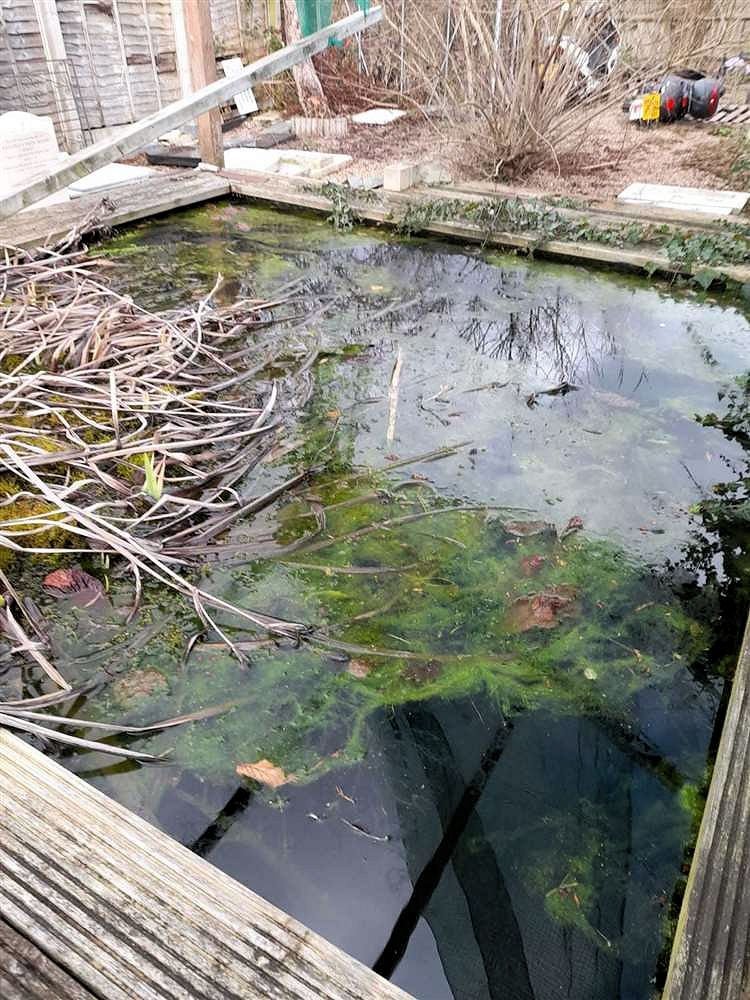
The pond at The Bull Inn pub in East Farleigh, which is subject to an
animal welfare investigation.
Their welfare, such as the water quality, were checked.
The investigation is ongoing.
KentOnline has attempted to contact the pub's owners for comment.
|
|
From the
https://www.kentonline.co.uk By Ben Austin, 26 July 2023.
East Farleigh residents discuss saving The Bull Inn pub but Stonegate
Group says it hopes to reopen it soon.
A company that owns a troubled pub says it is “keen to get it open as
soon as possible” but villagers are leaving nothing to chance.
Metal shutters now cover the windows and doors of The Bull Inn at East
Farleigh near Maidstone after it shut suddenly last year.
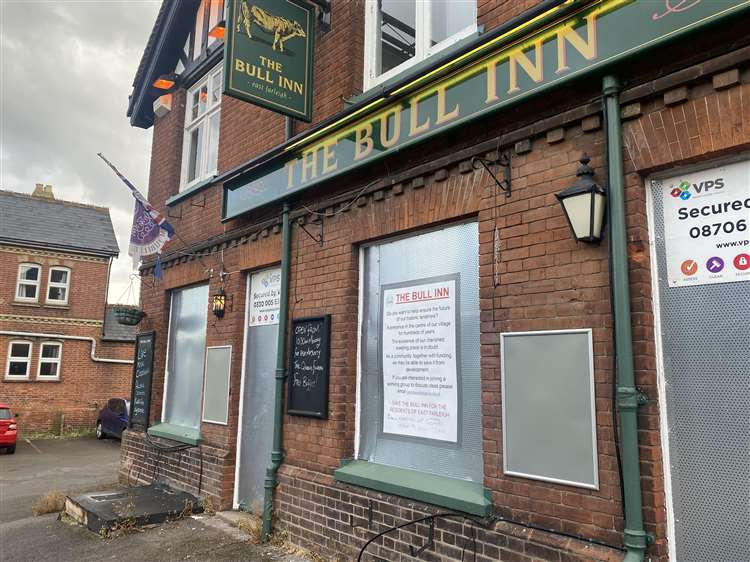
The boarded up Bull Inn in East Farleigh.
The pub, which belongs to the Stonegate Group, was home to a petting zoo
and last served customers in September.
In November, it was revealed that it was under investigation following
animal welfare concerns.
It has remained closed ever since, leading to residents, who fear it
could be turned into flats, getting together for a meeting last week in
an effort to save it.
East Farleigh Parish Council has applied for it to be designated an
Asset of Community Value (ACV) which would protect it from development.
After the meeting, a working group has also been set up to look at ideas
to safeguard the venue.
Parish councillor David Hussein, who is a member of the group along with
Deborah Abbott, Barry Older and Adam Palmer, said there had been
concerns about the way the pub had been run - but people were mainly
worried about its future.
“We had complaints over noise, over the events they were holding and the
animal welfare concerns.
“We also noticed though it was closed for some time no new tenants took
it on so we asked the owners what their intentions are.
“They said the intention was to find new tenants but couldn’t rule out
the development of the site.
“Our main concern is a pub which has been here for hundreds of years
will be developed.”
More than 40 people attended the meeting at Coxheath Primary school on
Wednesday, July 19 to discuss how they could help the pub reopen.
Ideas ranged from buying the building with funds provided for community
projects via Central Government, to running it as a community pub or
opening it as a shop.
Mr Hussein said: “The preferred choice would be to purchase the pub but
the owners currently have no intention of selling.
“But the working group are still looking into having their first meeting
in case the opportunity arises again to run it.”
It is understood that it took Stonegate until December to regain legal
possession of the building.
The last time the pub was open was September last year at the time of
the Queen’s funeral.
This week, a Stonegate Group spokesman said: “We are keen to get the
Bull Inn open as soon as possible for the local community to enjoy.
“We are in the process of recruiting a tenant and would be keen to
further explore any opportunity with the parish council and urge them to
contact us as soon as possible if they are looking to get involved with
the premises.”
Meanwhile, Maidstone council said its animal welfare investigation was
continuing “to decide whether further action is necessary”.
However, after council officers and police visited in November it had
concluded “there were no animals at risk at the property at that time”.
|
|
From the
https://www.kentonline.co.uk By Ben Austin, 7 February 2024.
The Bull Inn in East Farleigh given five-figure refurb after being taken over.
Punters have returned to a previously troubled pub following a
five-figure refurb.
The Bull Inn in East Farleigh, near Maidstone, has been behind boards
for more than a year after the pub closed in November 2022.
The previous landlords came under fire when it was reported the pub was
under investigation for animal welfare concerns.
Last weekend people were invited once again to enjoy a pint in the newly
remodelled establishment.
The work has been carried out in five weeks, with Oliver Aubrey taking
the helm on December 21.
The 33-year-old has been in the business since 2009 and in 2018 started
his own company.
He runs three other sites; "Drakes" in Maidstone town centre, The
"Walnut
Tree" in Tonbridge Road, and the "Little Gem" in Aylesford.
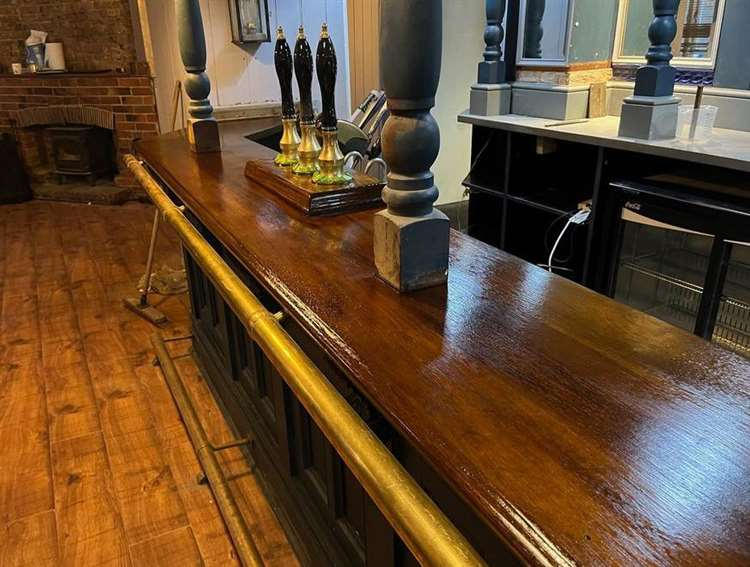
New bar in The Bull Inn East Farleigh. Picture: Bull Inn.
He said: “I have a good working relationship with Stonegate and we spoke
for a few months.
“I started looking around in the summer and wasn’t too sure but in
November I decided to take it on.”
Since taking over, Ollie has been working hard to get The Bull Inn to a
standard he is happy with.
He continued: “The previous owners left it in a bit of state to be
honest and we have had to strip it.
“Personally I will have spent more than £55,000 having the kitchen
refitted, and the main area re-furnished.
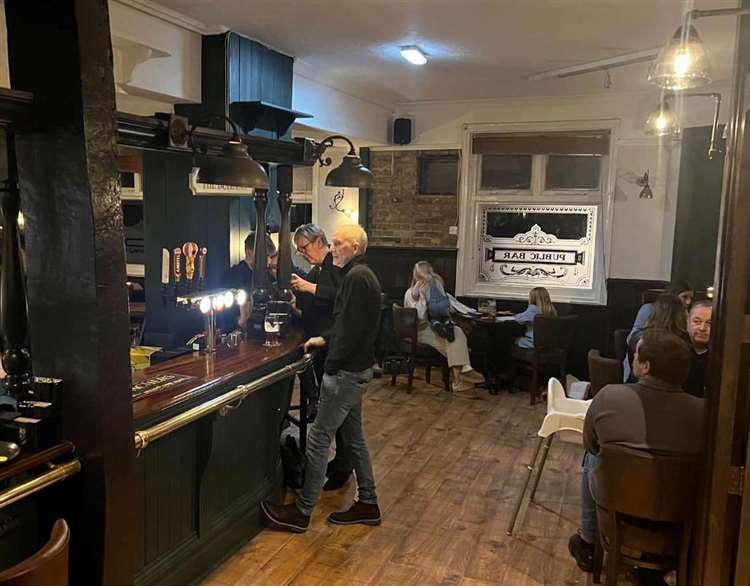
Customers enjoying the new-look Bull Inn. Picture: Bull Inn.
“Stonegate has covered the costs for now but I will be paying back over
the leasehold.
Despite a busy five weeks, more work is needing to be done but Oliver
did not want to wait any longer to reopen.
“It’s a bit bare for my liking,” he said, “But give it six months and
we’ll give it the character it’s lacking.”
Renovations are still underway but it hasn’t stopped punters already
popping their head in for a pint and to absorb the ambience.
Duncan Spencer was the leader of a community group which was looking
into buying the pub if it was to be sold for residential use.
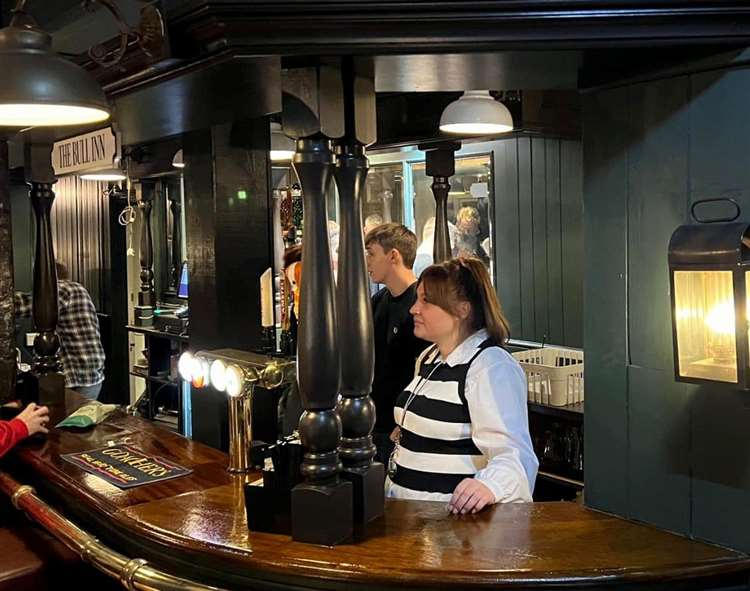
Staff manning the bar on Saturday. Picture: Bull Inn.
He visited the pub with much anticipation on Saturday and said: “It was
brilliant. The beer was good and there were a lot of people in.
“It has very much been improved upon. To be fair I never went in under
the previous manager but from what I have heard it is massively
improved.
“Ollie has done a really good job and the bar is back to looking how it
should.
“There’s nothing to stop us now so I hope to go back for more evenings
in the future.”
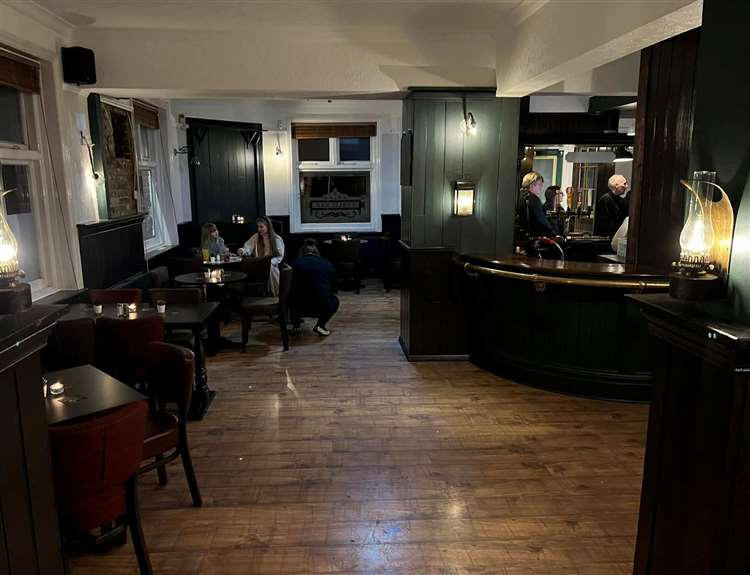
The redecorated interior of The Bull Inn.
The pub advertised on Friday (February 2) that it would be open for the
weekend and since then large bookings for wedding anniversaries and
birthday parties have already been made.
Oliver said: “It’s hard to tell early on the reaction but this time next
year I am hoping the industry will be in a better position.
“I think there was a need for it. Our motto here is ‘simple done well’
and I hope we are achieving that.
“Nothing flashy or fancy we just want that community pub feel where
people can come regularly enjoy themselves, and feel like they are
getting their money's worth.”
A spokesman for Stonegate said in December: “New management has now
taken over the site, and after some uplifting internal works, the pub
hopes to open as normal by the end of January.” |
LICENSEE LIST
List in Red from written history, not from local
papers information.
SCOFFELDE Joshua 1653-1704 dec'd
SCOFFELDE Samuel 1704-43
SCHOFIELD Thomas 1742-62 dec'd
MARTYN William 1762-90
POUNDFORD Peter 1790-1826 dec'd
MONK Mr to 3/Feb/1821 dec'd
CRITTENDEN Thomas 1826-45 dec'd
CRITTENDEN George 1826-22/June/41 dec'd (age 45 in 1841 ) )
 
CRITTENDEN Martha 1845-63 dec'd
STARTUP George 1863-71
TAPSFIELD William 1851+ (also Smith Master age 28 in 1851 ) )
CRITTENDEN William 1860-62+ (age 30 in 1861 ) )
TAPSFIELD Mark William Springett 1871-90 dec'd (also blacksmith aged 50 in 1881 ) )
TAPSFIELD Joseph William 1890-99 (age 26 in 1891 ) )
NORRIS George 1899-Jan/1900 fire
ROBERTS Russell 1900s
HOW Frederick S 1901+ (age 33 in 1901 ) )
JONES Arthur 1901+

SPRINGETT Jesse David 1913-18+
FRENCH Leslie William O 1922-30+
ROSSON William James 1938+
AUBREY Oliver 21/Dec/2023+
https://pubwiki.co.uk/BullInn.shtml
 From the Pigot's Directory 1828-29 From the Pigot's Directory 1828-29
 From the Pigot's Directory 1832-33-34 From the Pigot's Directory 1832-33-34
 Census Census
 From the Kelly's Directory 1903 From the Kelly's Directory 1903
|























